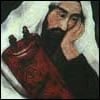Toronto, 2004
I glance hurriedly at my wristwatch on this busy Friday afternoon and I'm reminded of a story about a watch from another land and generation.
My young daughter notices my far-off expression. I begin to describe to her a different time when my own mother, Rebbetzin Batsheva Sudak-Schochet — her grandmother — was a youngster, not much older than she.
"In that foreign land, observing Shabbat was not as simple as it is today, a matter of just adding an extra potato to the simmering pot of cholent," I explain while peeling potatoes. "For Savta, keeping Shabbat was a perilous practice — one that could cost preciously."
I begin to tell her of a time when the moments ticking on a wristwatch might have marked the very gift of life...
Samarkand, 1943
The sounds of footsteps did not bode well for the young Sudak family, gathered around their Shabbat table. Adjacent to their home stood their underground soap factory. The factory was illegal in the Soviet Union and its discovery could mean instant imprisonment, being sent to the front, or languishing in frigid Siberia for years.
But, as dangerous as it was, the factory also spelled the Sudak's salvation, providing their sustenance while allowing them to avoid working on Shabbat. In those days of the Communist Party's all-out war on religion, observing Shabbat was not only an unheard of luxury that no employment would tolerate — it was a literal death sentence.
Rabbi Pinchas Sudak had taken all possible precautions to ensure that the factory's entrance was well hidden from any prying or meddling eyes, covered over by large planks of wood. But the approaching footsteps sounded like they knew where they were headed.
Someone had informed the authorities.
To the harsh sounds of wood being ripped apart, Pinchas and Batya made quick deliberations.
"Pinchas, run away." Batya ordered. "If they arrest you, you will surely be sent to the front. I will remain with the children, vehemently denying that the factory belongs to me. Hopefully, the penalty will not be as grave for me and they will have compassion for a lone mother with young children.
"Go now. Run, Pinchas!"
Pinchas gazed one last time at his beloved wife, before hastily leaping off the high wall surrounding their home. With a prayer in his heart that he would again be reunited with his family, Pinchas fled, racing to avoid detection and capture, his heart beating wildly.
Batya was promptly led off to prison, leaving her oldest child, eleven-year old Batsheva, to tend to her own fear and the fear of her two younger siblings, Nachman and Bracha.
But there wasn't the luxury of tears or fright. It was time for action.
Batsheva received a message via a family friend to immediately try to meet with her mother's interrogator, a cold-hearted female prosecutor who would determine the outcome of this case and who held the keys to her mother's freedom.
"Tell her that your mother does not own the factory. Your father is in the army fighting valiantly for Mother Russia. The man who ran away was your mother's Polish friend/lover who was helping the family make ends meet. He got the family into this illegal mess, while your mother is innocent," Batsheva was instructed.
With the heavy Communist indoctrination in the school system, officials tended to believe young children who, often enough, would succumb to the brainwashing they underwent and convict their own parents for "crimes" committed against the State.
Though only a youth, tall and mature Batsheva understood her grave responsibility and its sweeping implications. With immense faith and a heartfelt prayer on her lips, she squared her slight, young shoulders and confidently went to meet the prosecutor.
Batsheva convincingly told her tale and tearfully concluded, "Please, I miss her so much. I want my mother back!"
The prosecutor was touched by this attractive and personable young girl. "I'll see what I can do," she replied coolly.
The following day, Batsheva received a new message from her anxious father. "Go upstairs, into your mother's room, and open her drawer. You'll find an expensive gold watch. This time, go to the prosecutor's home. Tell her you want to present her with this gift. Don't ask for anything in return, just explain to her that you want to see your mother."
Batsheva did as instructed . For the next few days, she kept a vigilant watch in front of the prison. She was able to see her mother sitting outside on the cold ground, in a fenced-in area of the prison. She brought a coat for her to keep warm and daily delivered kosher food for her to eat.
Though it was comforting to see her mother, it was painful to see her behind bars in such woeful conditions. Those were difficult days for such a young girl, filled with intense anxiety about the future fate of her parents and family.
After two weeks, to Batsheva's surprised elation, her mother walked out of the prison door, a free woman. The prosecutor had closed the case, recording that the owner of the illegal factory was a Polish man who had fled upon its detection.
Pinchas remained in hiding. The plan was that Batya and her children would leave Samarkand shortly and the family would be reunited in far-off Tashkent.
Several weeks before their departure, on a Friday afternoon, as she was walking from her mother's house, Batsheva happened to meet up with the prosecutor. The woman, who had taken a liking to Batsheva, amicably told her that she had "another case on this street."
Having grown up in the Soviet Union, Batsheva understood the veiled meaning of her words. "A case" could only bode dangerously for her people. Immediately she informed her uncle. He ran ahead to the home of Rabbi Binyamin Gorodetsky, who lived on that street, and warned him of the imminent danger. R' Binyamin exited through his back door and raced to inform his brother, R' Simchah, of the peril.
R' Binyamin escaped, and eventually left Russia to settle in Paris. Unfortunately, his brother didn't heed the warning and was imprisoned for ten long years.
Two weeks later, on a Friday morning before the Sudaks' departure from Samarkand, Batsheva was walking from her grandmother's home and once again met the prosecutor.
"I'll be making an arrest," she matter-of-factly informed Batsheva.
Batsheva ran to the home of her uncle, R' Yisroel Leibov, but he dismissed her warning, thinking that a young girl couldn't possibly be privy to such information.
Late that night, Batsheva's aunt was arrested and her passport confiscated.
Early the next morning, a pale and tense R' Yisroel entered the Sudak home, asking Batsheva to bring some jewelry to the prosecutor. To the relief of the family, Batsheva was, once again, able to secure her aunt's release.
In the darkness of night, at the close of Shabbat, the Sudaks left Samarkand to make the long journey for Tashkent. Over three hundred kilometers away, they hoped that the long arm of the Soviet secret police wouldn't follow them.
But that is a whole other story. Not one to be told on a busy Friday afternoon....
Conscious of the approaching Shabbat, I pause to glance down at my wrist. A young girl... a gold watch... the holy day of rest... And the indomitable spirit and invincible faith of our people.






Join the Discussion